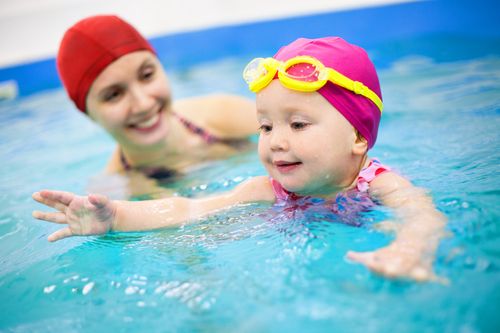Flocculant and your pool - do you need them?

There are a lot of pool chemicals and additives available to pool owners and operators that are entirely optional. Some use them, others don't. Some folks don't even know that many of them exist!
Flocculant - or flocc, for short - is a chemical product that can be added to a cloudy pool to collect all the organic matter that is creating a problem with your water, clump it together to make it so heavy that it sinks to the bottom of the pool. Once that has happened, your pool vacuum can go along and collect all the dirty matter, eliminating it from your pool.
Sounds pretty handy, no?
It certainly can be, but it should be used only in extenuating circumstances and here is why: it doesn't FIX what was wrong with your water that made it cloudy, it simply hid the symptoms.
There are a myriad of reasons your pool water might be cloudy, and you're going to want to get to the root of the problem to prevent it from happening again. Using a flocculant will get rid of the evidence, but the problem will simply return in time if you don't cure it properly.
For commercial facilities, you're also going to want to consider the detail of a vacuum. Most commercial facilities rely on their heavy duty skimmer systems to keep organic matter properly filtered out of their pool, not vacuums. If your pool is not regularly vacuumed and/or scrubbed, using flocculant will result in a buildup on the bottom of your pool. All the junk that the flocc collected simply fell to the ground. It didn't disappear. It is laying in wait, either to be cleaned away properly, or for some unsuspecting foot to step on.
Flocculant - or flocc, for short - is a chemical product that can be added to a cloudy pool to collect all the organic matter that is creating a problem with your water, clump it together to make it so heavy that it sinks to the bottom of the pool. Once that has happened, your pool vacuum can go along and collect all the dirty matter, eliminating it from your pool.
Sounds pretty handy, no?
It certainly can be, but it should be used only in extenuating circumstances and here is why: it doesn't FIX what was wrong with your water that made it cloudy, it simply hid the symptoms.
There are a myriad of reasons your pool water might be cloudy, and you're going to want to get to the root of the problem to prevent it from happening again. Using a flocculant will get rid of the evidence, but the problem will simply return in time if you don't cure it properly.
For commercial facilities, you're also going to want to consider the detail of a vacuum. Most commercial facilities rely on their heavy duty skimmer systems to keep organic matter properly filtered out of their pool, not vacuums. If your pool is not regularly vacuumed and/or scrubbed, using flocculant will result in a buildup on the bottom of your pool. All the junk that the flocc collected simply fell to the ground. It didn't disappear. It is laying in wait, either to be cleaned away properly, or for some unsuspecting foot to step on.

We occasionally have customers calling us asking us about gunk on their pool floor, hoping to place the blame on our liquid pool covers. Other people call with claims that their filters have been clogged, and they're not sure why.
In both cases, we can often tie the issue back to their use - generally an overuse and/or misuse - of flocculant.
Swimming pools are built with skimmers systems to take organic matter from a swimming pool and send it through the filter. Filters are designed to collect tiny particles of matter that you don't want inside your pool. Depending on the filter type, you will need to rinse or backwash your filter on a schedule to clean out this debris from the filter.
When you use flocculant, the matter is no longer a tiny particle, but a larger clump, gelled together with the collecting agent (the flocc). Used only every once in a while, this probably won't affect your filter too greatly. However, with continued use of flocculant, your filter is more likely to get clogged as it is now being fed much larger particles than it was really designed for.
In all honesty, if you use a flocculant on a regular basis alongside Heatsavr or Ecosavr, it will affect the liquid cover to some extent.
The mission of a flocculant is to take organic matter and coagulate it all together to make it easier to be filtered out. As mentioned, the process includes a sinking of the organic matter, and a vacuum or determined pool cleaner to remove the resulting coagulated material.
Liquid pool covers are organic material and can be targeted and stuck to flocculant. Our products are designed to float immediately to the surface of the water, whereas flocc works throughout the body of water, so the majority of our product won't be affected, but it can still alter the results you may be hoping for.
To sum up this post, flocculant should not be used on a daily basis in a swimming pool as a means of keeping your pool water clear. If your pool water is consistently cloudy, you have a bigger problem that you should identify and fix, at the root.
If you'd like to do some additional reading on the subject - I am NOT a flocculant expert, so I encourage you to do so! - here are a few additional resources that might help:
In both cases, we can often tie the issue back to their use - generally an overuse and/or misuse - of flocculant.
Swimming pools are built with skimmers systems to take organic matter from a swimming pool and send it through the filter. Filters are designed to collect tiny particles of matter that you don't want inside your pool. Depending on the filter type, you will need to rinse or backwash your filter on a schedule to clean out this debris from the filter.
When you use flocculant, the matter is no longer a tiny particle, but a larger clump, gelled together with the collecting agent (the flocc). Used only every once in a while, this probably won't affect your filter too greatly. However, with continued use of flocculant, your filter is more likely to get clogged as it is now being fed much larger particles than it was really designed for.
In all honesty, if you use a flocculant on a regular basis alongside Heatsavr or Ecosavr, it will affect the liquid cover to some extent.
The mission of a flocculant is to take organic matter and coagulate it all together to make it easier to be filtered out. As mentioned, the process includes a sinking of the organic matter, and a vacuum or determined pool cleaner to remove the resulting coagulated material.
Liquid pool covers are organic material and can be targeted and stuck to flocculant. Our products are designed to float immediately to the surface of the water, whereas flocc works throughout the body of water, so the majority of our product won't be affected, but it can still alter the results you may be hoping for.
To sum up this post, flocculant should not be used on a daily basis in a swimming pool as a means of keeping your pool water clear. If your pool water is consistently cloudy, you have a bigger problem that you should identify and fix, at the root.
If you'd like to do some additional reading on the subject - I am NOT a flocculant expert, so I encourage you to do so! - here are a few additional resources that might help:
Recent
Not Another New Year's Blog Post
January 4th, 2017
Setting 2017 Goals for Your Aquatic Facility
December 20th, 2016
Why Swimming Pool Exercise is Better than Land Based Exercise
December 13th, 2016
Being a Winter Safe Haven for your Fair Weather Friends
December 6th, 2016
De-Stress the Care and Maintenance of your Aquatics Facility
November 29th, 2016
Archive
2017
2016
April
Alkalinity - What's Happening in Your PoolBackwashing - How it will affect your pool experienceChloramine levels and liquid pool coversDrought - Is it Conflicting With Your Pool Opening?Environmental Awareness Can Actually Save You MoneyFlocculant and your pool - do you need them?Gutter Skimmers and Pool Circulation SystemsHeat Loss - How to Control your Pool Water TemperatureImitation - Know What Your Options Really AreJets, Fountains, Water Features and MoreKeep you pool warmer, longerLiquid Pool Covers - Which One is Right for You?Moisture in the Air - Fight Humidity Levels in Indoor Pool AreasNatatoriums - Indoor Air Quality ControlOpening Season Has Arrived!Proof of Efficiency and Safety - What's Really ImportantQuality Control: Should Pool Owners do their Own Dirty Work?Reduce Your Impact, Conserve your ResourcesSafe and Sound: Liquid Pool Cover FactsTestimonials, Tests & Trial ResultsUV & Ozone Treatments Systems and Liquid Pool CoversVapor Retardants and Water ConservationWater & Energy Conservation Guide (Video)Xerophyte - What is it and why should you care?Yard Differentials - Any Time. Any Place. Any Pool. Always Safe.Zebras and Swimming Pools - Maybe we can't actually help with everything
May
June
July
August
October
Being in Control and Saving Money at Your Aquatic Center Here Is A Product that is Helping Commercial Pool Operators Like Yourself Save Energy AND Reduce Their Stress Levels The Highest Fright Factor for Your Swimming Pool Doesn't Only Come Around on Halloween Simple Steps to Reduce the Footprint of Your Swimming PoolPeak Performance: Humans vs. Swimming Pools
November
2015
2014
March
Challenge your energy bill.NSF Approved, Cost Reducing, Energy Efficient Swimming Pool Product for YOU!Thinking outside the "Box" can help grow your business this seasonDoes your facility offer Scuba Diving Lessons?Do Liquid Pool Covers Work on Infinity Edge Pools?Online Photographs - the 2014 method of "Window Shopping"If my pool is small, how long will Ecosavr last?
2013
January
May
The Fringe Benefits of ADA CompliancyFishing for Customers - The Sales GameHow Much Do Liquid Pool Covers Cost?How do Liquid Pool Covers WorkMay is National Water Safety Month!Plastic Solar Blankets VS Liquid Pool Covers: Round 1Plastic Solar Blankets VS Liquid Pool Covers: Round 2Plastic Solar Blankets VS Liquid Pool Covers: Round 3Plastic Solar Blankets VS Liquid Pool Covers: Round 4Plastic Pool Blankets VS Liquid Pool Covers: Round 5
June
July
2 Comments
We have been noticing some buildup in our pool as well. I never would have thought it was because of improper flocculant use. I guess it is important to have a balance of using chemicals and the pool cover.